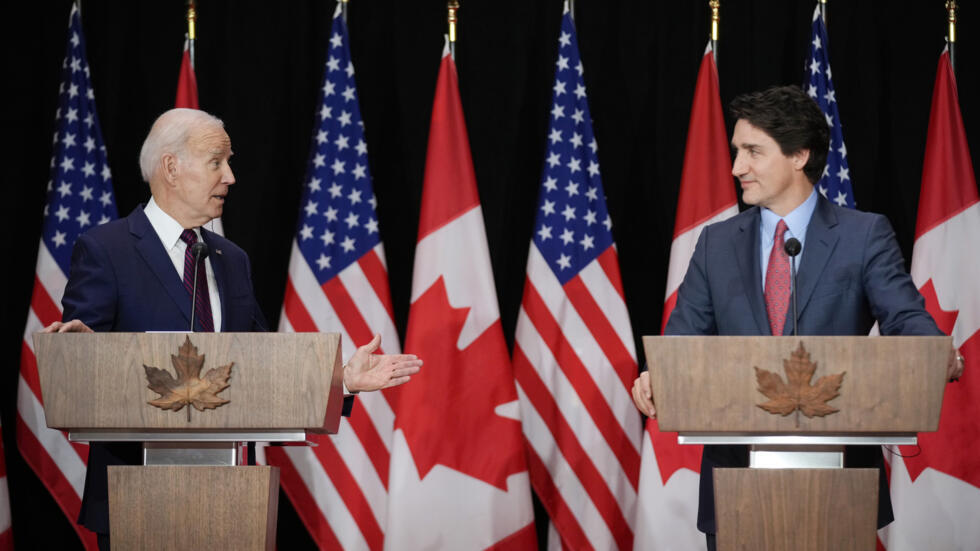Canada Election: Trump's View Of US-Canada Economic Interdependence

Table of Contents
Trump's Trade Policies and their Impact on Canada
Trump's "America First" approach dramatically altered the landscape of US-Canada trade. His administration's actions, particularly regarding trade agreements and tariffs, left lasting impacts on the Canadian economy.
NAFTA Renegotiation (USMCA): A Shifting Trade Landscape
The renegotiation of NAFTA into the USMCA (United States-Mexico-Canada Agreement) was a defining moment. While presented as an update, the changes implemented significantly impacted several Canadian industries.
- Dairy Industry: Increased US access to the Canadian dairy market resulted in considerable disruption and competition for Canadian dairy farmers. Tariffs were adjusted, leading to price fluctuations and economic uncertainty.
- Lumber Industry: The USMCA included provisions affecting the softwood lumber trade, a longstanding source of tension between the two countries. Trade disputes continued, despite the agreement, creating instability for Canadian lumber producers.
- Automotive Sector: Changes to rules of origin within the automotive sector affected Canadian automakers, requiring a higher percentage of North American content in vehicles to avoid tariffs. This necessitated significant adjustments to supply chains and manufacturing processes.
These adjustments, while aiming for a more balanced trade relationship according to the US, resulted in short-term economic anxieties and long-term adjustments for many Canadian businesses. The impact of these trade disputes and tariffs ripple through the Canadian economy, creating uncertainty for businesses and consumers. Keywords: USMCA, NAFTA, trade agreements, tariffs, trade disputes, Canadian economy, dairy industry, lumber industry, automotive sector.
"America First" and its Implications for Bilateral Trade and Investment
Trump's protectionist stance manifested in various ways, negatively affecting bilateral trade and investment.
- Steel and Aluminum Tariffs: The imposition of tariffs on Canadian steel and aluminum triggered retaliatory measures from Canada, disrupting supply chains and escalating trade tensions.
- Threats of further tariffs: The constant threat of additional tariffs on other Canadian goods created an atmosphere of uncertainty, discouraging investment and hindering economic growth. Businesses hesitated to expand or commit to long-term projects due to the unpredictable trade environment.
- Reduced Foreign Investment: The protectionist rhetoric and actions of the Trump administration discouraged US investment in Canada, impacting job creation and economic development.
This "America First" approach, while aiming for greater US self-reliance, created significant challenges for Canadian businesses relying on seamless trade with their southern neighbor. Keywords: protectionism, trade barriers, bilateral trade, foreign investment, economic nationalism, steel tariffs, aluminum tariffs.
Canadian Public Opinion on Trump's Economic Policies
The impact of Trump's economic policies extended beyond mere economic figures; it deeply influenced Canadian public opinion and the political landscape.
Polling Data and Public Sentiment
Numerous polls conducted during Trump's presidency revealed a significant shift in Canadian attitudes towards the US and its trade policies.
- Negative Views of Trump: A consistent majority of Canadians expressed disapproval of Trump's policies and leadership style, influencing their views on US-Canada relations.
- Concerns about Trade Relations: Public opinion surveys showed significant concern regarding the impact of Trump's trade policies on the Canadian economy and job security.
- Increased Support for Trade Diversification: Many Canadians expressed support for diversifying trade relationships to reduce reliance on the US market.
These shifts in public opinion significantly impacted the political discourse and influenced voting patterns in the lead-up to the current election. Keywords: public opinion, polling data, Canadian elections, voter sentiment, political landscape, US-Canada relations.
Impact on the Canadian Political Landscape
Trump's policies significantly shaped the platforms and strategies of various Canadian political parties.
- Increased Focus on Trade Diversification: Parties across the political spectrum acknowledged the need to strengthen trade relationships with countries beyond the US.
- Emphasis on Strengthening Canadian Industries: There was a greater focus on supporting domestic industries and mitigating the potential negative impacts of protectionist policies from the US.
- Differing Approaches to US Engagement: While all parties aimed to maintain a positive relationship with the US, their approaches to engaging with the American administration differed significantly based on their political ideologies.
The Canadian political discourse leading up to the election was heavily influenced by these concerns, highlighting the significant impact of Trump's presidency on Canadian politics. Keywords: political parties, election campaigns, party platforms, electoral strategies, political discourse, trade diversification.
The Energy Sector and its Vulnerability to US Policies
The energy sector, particularly oil and gas, exemplifies the economic interdependence between Canada and the US. This interdependence makes Canada vulnerable to protectionist measures and policy shifts from the US.
- Keystone XL Pipeline: The cancellation of the Keystone XL pipeline project under the Biden administration highlighted the vulnerability of Canadian energy exports to shifting US policies. While this happened after Trump, the initial approvals and subsequent delays highlight the potential for disruption.
- Energy Security Concerns: The reliance on US markets for Canadian energy exports raises concerns about energy security for Canada and the potential for significant economic repercussions due to disruptions in the US energy market or policy shifts.
The Canadian energy sector remains highly sensitive to US policy decisions, and the upcoming election's outcome will influence how Canada navigates this crucial relationship. Keywords: energy sector, oil and gas, energy security, pipeline projects, Keystone XL pipeline, Canadian energy exports.
Conclusion: The Enduring Legacy of Trump's Influence on Canada's Election
Trump's trade policies, his "America First" approach, and the resulting impact on the Canadian economy and public sentiment have profoundly shaped the current Canadian election. The renegotiation of NAFTA, the imposition of tariffs, and the general uncertainty created by Trump's administration have left an enduring legacy on the Canada-US economic relationship. The Canadian public's response, along with the resulting adjustments to Canadian political platforms, underscores the significant and lasting impact of Trump's presidency on the Canadian political landscape.
Key takeaways include the increased focus on trade diversification, a strengthened emphasis on supporting domestic Canadian industries, and a more cautious approach to US-Canada economic relations. The energy sector's vulnerability remains a major concern, highlighting the ongoing need for a balanced and resilient approach to trade and economic security.
Stay informed on the Canada election and the future of US-Canada economic interdependence. Understand the implications of the Canada Election for US-Canada trade and vote strategically considering the future of US-Canada economic relations. Your informed participation is crucial in shaping the future of this vital bilateral relationship.

Featured Posts
-
 Adidas Spring Sale 14 Slides Flying Off Shelves
Apr 30, 2025
Adidas Spring Sale 14 Slides Flying Off Shelves
Apr 30, 2025 -
 3 Dias Para Tu Clase De Boxeo En Edomex Apurate
Apr 30, 2025
3 Dias Para Tu Clase De Boxeo En Edomex Apurate
Apr 30, 2025 -
 Us Navy Loses 60 Million Jet Overboard Aircraft Carrier Incident
Apr 30, 2025
Us Navy Loses 60 Million Jet Overboard Aircraft Carrier Incident
Apr 30, 2025 -
 Holocaust Memorial Council Controversy Understanding Trumps Decision On Doug Emhoff Jta
Apr 30, 2025
Holocaust Memorial Council Controversy Understanding Trumps Decision On Doug Emhoff Jta
Apr 30, 2025 -
 000 Euro Di Risarcimento Per Gli Accusatori Di Becciu La Sentenza Del Tribunale
Apr 30, 2025
000 Euro Di Risarcimento Per Gli Accusatori Di Becciu La Sentenza Del Tribunale
Apr 30, 2025
